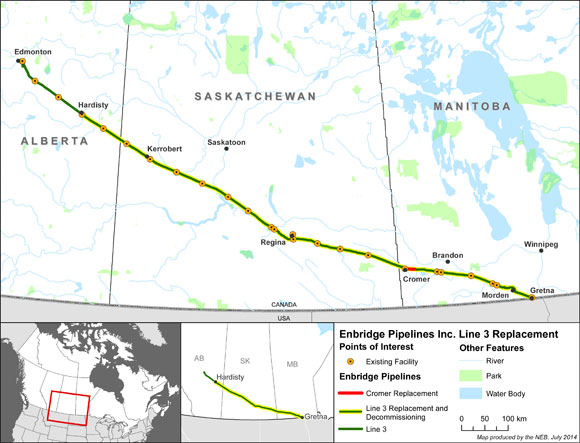The federal government has given the green light to Enbridge’s Line 3 Replacement Program (LR3P), which passes through Regina.

The $7.5 billion dollar replacement and expansion project will see up to 760,000 barrels a day from Hardisty, Alta. go through Saskatchewan and Manitoba and down to Superior, Wis.

Premier Brad Wall called it a significant investment in Saskatchewan’s economy, one that will mean about $1.1 billion dollars in economic impact.
READ MORE: Justin Trudeau halts Northern Gateway, approves Kinder Morgan expansion, Line 3

Get daily National news
LR3P’s new capacity — at 760,000 barrels a day — is almost double its current maximum output.
According to the Steelworkers Union’s Courtland Klein, work had already begun on the pipeline — and steelworkers were depending on an approval.
“We’re halfway through building this pipeline right now and we were very nervous the government could go the other way,” Klein said.
Klein said they represent close to 1,000 unionized workers at Evraz’s Regina mill and employees couldn’t be happier with the decision.
“The guys are very excited knowing they have some job security going into the new year…. we’re very excited.”
But not everyone is thrilled with the decision. The Saskatchewan Environmental Society said they were opposed to the expansion — highlighting environmental concerns.
“We’re really concerned about the upstream and downstream gas emissions that will be associated with the project,” policy coordinator Hayley Carlson said.
READ MORE: TransMountain, Line 3 are moving forward – they could still face major delays
Instead, she said there needs to be more investments in renewable energy.
“Saskatchewan has ample solar and wind potential and even hydro and we should be looking at those for job opportunities and energy production,” she said.
The Federation of Sovereign Indigenous Nations (FSIN) also chimed in, saying land and water consultation with First Nation must be a top priority.
“As projects like L3RP go forward it is crucial that stringent protections for the environment be put in place to protect our communities and that our First Nations concerns and recommendations are abided,” read a statement from FSIN Chief Bobby Cameron.
Pending U-S approvals, the pipeline is expected to be done in 2019.


Comments
Want to discuss? Please read our Commenting Policy first.